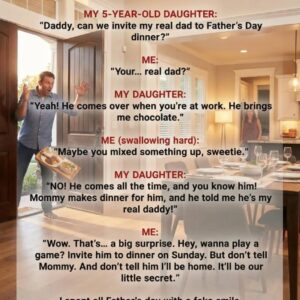
“The Night That Changed Everything”
I woke in the middle of the night to a strange sound—soft, almost childlike humming followed by light giggles echoing through the dark room. For a moment, I thought I was dreaming. But when I turned over, I saw my husband, Sayed, lying next to me, his eyes half-open, fluttering his hands in the air like a child pretending to fly. His lips twitched with laughter, and his body moved in strange, jerky spasms.
Something was wrong—terribly wrong.
“Sayed?” I whispered, gently shaking his shoulder. He didn’t answer. The laughter turned into distorted, unintelligible words. Panic surged through me. My hands trembled as I reached for my phone and dialed 911.
Moments later, flashing red and blue lights painted our street. Paramedics rushed in, checked his vitals, lifted him onto a stretcher, and whisked him away. I followed, my heartbeat louder than the sirens outside.
At the hospital, a doctor with kind eyes and a serious tone finally approached me. “Your husband had a mild seizure,” he explained. “It was likely brought on by extreme stress or lack of sleep.”
I sat in the hallway, staring through the glass at Sayed’s unconscious body, now reduced to beeping monitors, breathing masks, and IV lines. He looked like a stranger. The man I married had become someone I no longer recognized.
A nurse approached quietly and asked if he’d been behaving strangely lately. I opened my mouth to say no—but I stopped.
The truth was, something had been off for months. Sayed had grown distant. He stayed up late with his laptop, always closing it the second I walked into the room. His phone never rang—it was always on silent. I once overheard a woman’s name—Nadia—during a call in the kitchen. He claimed she worked in procurement. I wanted to believe him. I blamed his behavior on stress, on work, on everything but what my instincts were trying to tell me.
But as I sat there watching his still body, I couldn’t lie to myself anymore.
That night, when I returned home to grab a few clothes, I passed by his desk. His laptop was open. I hesitated. I wasn’t sure what I was even looking for—just that I couldn’t ignore the sinking feeling in my stomach any longer.
There was no password.
Inside a folder labeled “Invoices_2022,” I expected spreadsheets. What I found instead were names, payments, and notes—over $50,000 in transfers. One entry stopped my breath: “E-transfer: Nadia L. – $4,200 – Tuition Payment.”
Tuition?
I searched his email for her name. Hundreds of messages came up. It started innocently, then drifted quickly: inside jokes, flirty texts, late-night confessions. Talk of escaping to Santorini. And then, photos. One in particular shattered me—Sayed kissing a young woman with pink curls and gold hoop earrings. The timestamp? October. The same weekend he claimed he was at a business conference in Montreal.
The man I thought I knew had been living a double life.
The next morning at the hospital, he acted like everything was normal—sipping juice, making jokes, texting someone behind my back. But when we got home, I couldn’t pretend anymore.
“Who’s Nadia?” I asked, my voice steady.
He froze. “It’s not what you think,” he muttered.
The oldest lie in the book.
He claimed she was a family friend’s daughter. That he’d just helped her with school. That it wasn’t romantic. But I showed him the messages, the photos, the receipts. And slowly, the lies began to unravel. He admitted it got “complicated.” That he was “emotionally confused.”
“Did you sleep with her?” I asked.
Three seconds of silence told me everything.
I didn’t scream. I didn’t cry. I just left. I drove to my cousin Rukhsana’s place and collapsed into her arms. Two weeks away gave me clarity. I dug deeper. On Nadia’s social media, I found more—she called him Shawn. He had an entire second identity. He’d been living two lives—ours, and his fantasy.
I met with a lawyer. And what we uncovered made my stomach twist: he’d taken out a second loan on our house. Maxed out credit cards in my name. Forged my signature on financial documents.
I confronted him again. This time, he broke. He handed me a box—full of bank statements, documents, emails. Evidence of his spiraling web of lies.
I filed for divorce that very day.
Months passed. Then came a final twist. A letter arrived—a legal complaint from Nadia. She accused him of scamming her, promising business funding while pretending to be divorced. Her viral video destroyed him. His reputation collapsed. His business failed.
But I was rebuilding.
I started taking music lessons at the community center. Reached out to friends I had lost touch with. Joined a women’s support group. Slowly, the fog lifted. The silence that used to drown me began to fill with laughter again.
One weekend at a local craft fair, I met Teo—a retired mechanic with kind eyes and a peaceful presence. We talked about old cars and potted herbs. It wasn’t fireworks. It was peace. No secrets. No lies.
I took it slow. This time, I listened to my instincts. I trusted the voice I had ignored for far too long.
Looking back, I can see it clearly now—the late nights, the whispers, the hidden documents. We silence our own doubts to preserve love. But sometimes, the truth doesn’t whisper. Sometimes, it grabs you in the middle of the night—wearing a smile that isn’t real.
And when you finally listen, you can begin again.
So if your gut is telling you something’s wrong, don’t brush it aside.
The truth will find a way to reach you.
And when it does, you’ll have a choice.
Choose yourself.
Choose freedom.
Because freedom, I’ve learned, is everything.



